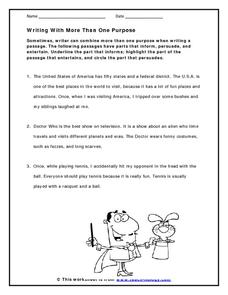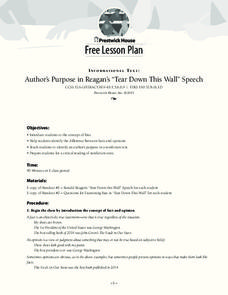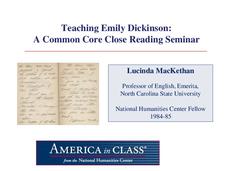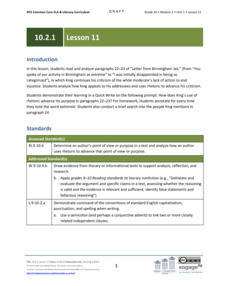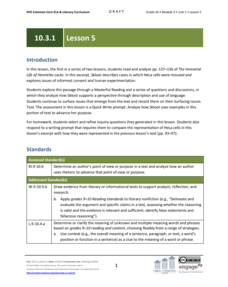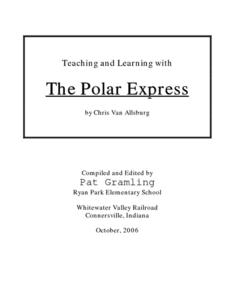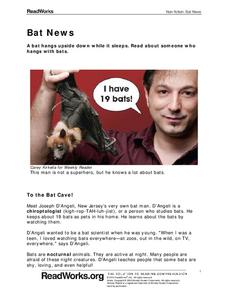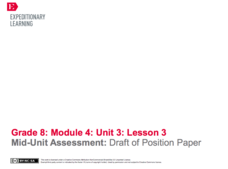Have Fun Teaching
Identifying Author's Purpose
The multi-lesson, 47-page packet contains everything you need to ensure kids can recognize the clues provided to identify the type of text, the intended audience, and the author's purpose in writing the passage.
Teach-nology
Author’s Purpose
What is the author's purpose in writing a joke book? What about a book about the digestive system? Explore author's purpose with a activity that challenges kids to identify whether ten books are meant to entertain, inform, or persuade.
Teach-nology
Author’s Purpose: Entertain
How does an author entertain his or her audience? Read a short fairy tale and find the most evocative passages to discover more about author's purpose in narrative writing.
Teach-nology
Author's Purpose
Challenge your class to find the three purposes for writing. After they read three short passages, kids note whether the author's purpose was to inform, persuade, or entertain.
Teach-nology
Author’s Purpose: Persuade
Explore author's purpose with an activity about persuasive arguments. After reading a short passage about Spain, learners identify three main passages that the author uses to persuade the reader.
Teach-nology
Author’s Purpose
What is the author's purpose when writing a narrative story? Kids read a short narrative passage before answering three questions about author's purpose.
Teach-nology
Author’s Purpose: Inform
Why does an author write an informative article? Learners examine passages of a short reading on Spain and determine what the author wanted to inform the reader about.
Teach-nology
Writing with More Than One Purpose
It's not very hard to find the author's purpose in narrative, informative, or persuasive writing, but what happens when an author's purpose includes all three types of writing? Determine which sentences in three paragraphs are meant to...
Teach-nology
The Purpose of Summaries
How can you tell the author's purpose from just a short summary? Kids read three different summaries of books to determine whether the author meant to entertain, persuade, or inform.
Prestwick House
Author’s Purpose in Reagan’s “Tear Down This Wall” Speech
President Ronald Reagan's "Tear Down This Wall" speech, delivered on June 12, 1987 before the Berlin Wall, provides class members with an opportunity to examine three key aspects of informational text: author bias, the use of facts and...
EngageNY
Grade 11 ELA Module 2: Unit 2, Lesson 2
How did Elizabeth Cady Stanton advocate for women's rights? Pupils consider this question as they continue reading "An Address by Elizabeth Cady Stanton." They complete a Quick Write, analyzing how satire and sarcasm advance the author's...
National Humanities Center
Teaching Emily Dickinson: A Common Core Close Reading Seminar
Three of Emily Dickinson's poems, "I like to see it," "Because I could not stop for Death," and "We grow accustomed to the Dark," provide instructors with an opportunity to model for class members how to use close reading strategies to...
EngageNY
Grade 10 ELA Module 2: Unit 1, Lesson 11
Choose your words carefully. Martin Luther King Jr. carefully chooses his words to provide evidence to support his claim about segregation. Scholars work in pairs to discuss previous lessons, complete homework assignments, determine the...
EngageNY
Grade 10 ELA Module 3: Unit 1, Lesson 5
Science over humanity? Scholars analyze an excerpt from The Immortal Life of Henrietta Lacks. They must consider if the experimentation of Henrietta's cells without her consent was worth the information gained about cancer. They discuss...
Mr. Ambrose
The Great Gatsby, F. Scott Fitzgerald
Good discussion questions, quizzes, and tests teach as well as assess. Readers of The Great Gatsby will learn much from the materials in a 36-page packet designed to help students prepare for the AP Literature exam. Included in the...
Scholasic
The Magic School Bus and the Missing Tooth
We chew with our teeth every day, but how much do we really know about them? Allow Ms. Frizzle to teach your kids a thing or two about teeth. Kids complete a prereading exercise, read the book, and respond to several prompts about the...
Whitewater Valley Railroad
Teaching and Learning with The Polar Express
Use a series of extension activities to enhance your class reading of Chris Van Allsburg's holiday classic, The Polar Express. From a biography of the author to filmed book reviews and research about the railroad, kids can take...
K20 LEARN
Writing An Argumentative Paragraph: Argumentative Writing
Learning how to craft a cogent argument based on a solid claim, supported with evidence and solid reasoning, is an important life skill. Teach middle schoolers about argumentative writing with a instructional activity asking them to...
Reed Novel Studies
Sounder: Novel Study
Only one character receives a name in William H. Armstrong's novel, Sounder—the dog! With the novel study, scholars explore the author's purpose in the unusual decision. They also write similes, answer comprehension and analysis...
Read Works
Bat News
Get the bat facts with a short nonfiction reading passage. After reading the passage, readers respond to questions that focus on main idea, inferencing, vocabulary in context, and author's purpose.
K20 LEARN
It's All About Balance! Parallel Structure
I came, I saw, I conquered! Parallel structure, employed by writers even before Julius Caesar, is the focus of a instructional activity that teaches young writers the power of this rhetorical device. Class members analyze speeches by Dr....
Arizona Department of Education
Introduction to Integers
Welcome to the backward world of negative numbers. This introductory lesson teaches young mathematicians that negative numbers are simply the opposite of positive numbers as they use number lines to plot and compare...
EngageNY
Grade 9 ELA Module 1, Unit 1, Lesson 12
Finding the central idea in a text can be as simple as deciphering the correct pieces of supporting evidence. As your class reads Stage 4 of "St. Lucy's Home for Girls Raised by Wolves" by Karen Russell, they analyze the interactions...
EngageNY
Mid-Unit Assessment: Draft of Position Paper
What is the purpose of an introduction and conclusion? Using the resource, scholars review the model position paper from activity one and discuss the author's choices. Next, they draft their position papers' introductory and concluding...







